MKV vs MP4 vs WebM: Which is the Best Video Format
When it comes to digital video formats, MKV, MP4, and WebM are three of the most commonly used. Many users are confused about which format to use for archiving, everyday use, and online streaming. This is the reason we came up with the idea of MKV vs. MP4 vs. Webm discussion. We aim to help every single user to better understand their distinctions. In today’s post, we will highlight each format and its purpose clearly. So, if you want to know more about it, read on!
 MKV VS MP4 VS Webm
MKV VS MP4 VS Webm
Part 1. What are MKV, MP4, and WebM Formats
MKV Format (Matroska Video)

The Matroska Video, known by many as MKV format, is an open-source multimedia container format. This file is known for its ability to hold multiple audio and subtitle tracks. It can contain various codecs, like H.264, H.265, AAC, DTS, etc. In addition, MKV files support metadata customization, allowing users to add detailed information. Although not universally supported, it is best used in high-quality content, such as Blu-ray rips and online video.
MP4 Format (MPEG-4 Part 14)
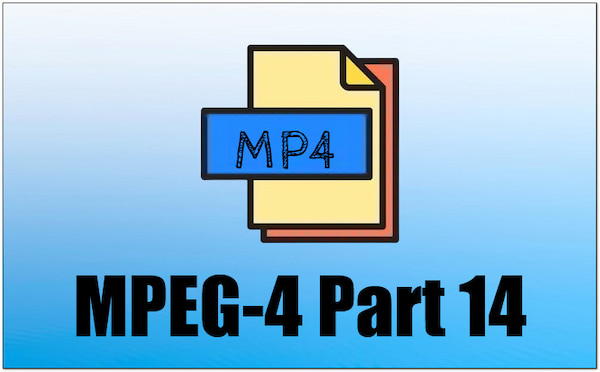
Short for MPEG-4 Part 14, MP4 is a highly popular and most-used video format. It is recognized for its efficient compression and broad compatibility, commonly used in video streaming. MP4 is also playable on various devices and platforms, including smartphones, computers, and gaming consoles. MKV vs MP4 data handling: MP4 files can store video, audio, images, and other data. In terms of supported codecs, MP4 files can handle AVC, HEVC, VP9, VP8, and AV1.
WebM Format (Web Media File)
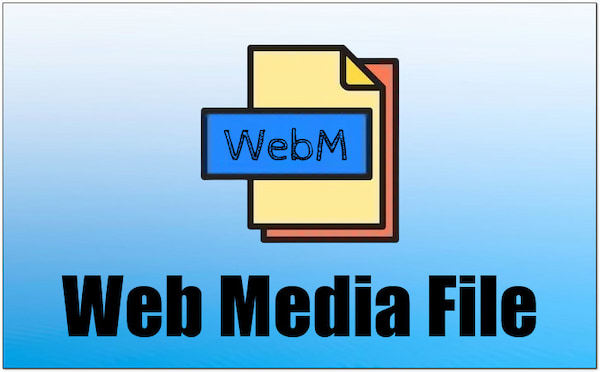
Created by Google, WebM is a royalty-free, open-source format designed particularly for online video use. It is based on the Matroska container structure and uses VP8, VP9, and Vorbis codecs. Not to mention, these codecs are optimized for HTML5 video streaming. It ensures efficient loading and high-quality video playback on web browsers. As a format created for online usage, WebM is supported by modern browsers like Chrome, MS Edge, and Firefox.
Part 2. MKV vs MP4 vs WebM
Compatibility
Is MKV better than MP4? It depends on which and where the format will be used.
MKV is preferred for high-quality media storage and complex video projects. Although it is highly flexible, this format lacks universal compatibility across devices. In actuality, many media players and devices do not support MKV files natively. Therefore, a specific media player that supports the MKV format is required to playback this file. MP4, on the other hand, is a universally used format favored across nearly all devices. This includes operating systems, mobile devices, gaming consoles, and online streaming services.

Blu-ray Player, picked by 4Videosoft, is a multi-format media player that goes beyond Blu-ray playback. Although the name suggests it is intended for Blu-ray playback, it can actually handle all video formats. This media player can play video and audio in formats like MKV, MP4, WebM, etc. Aside from standard and high-definition videos, it also supports higher-resolution videos, such as 1080i, 1080p, and 4K. The best thing of all, it supports advanced audio effects. Options include AAC, TrueHD, Dolby, DTS, DTS-HD, and surround sound 5.1 and 7.1 channels.
As mentioned, WebM files are intended for web use. It works efficiently with modern browsers and web-based platforms, but they are less supported outside the web. In other words, these files have limited playback on non-browser-based apps and devices. If you want to make your WebM files compatible with various devices and platforms, converting them is a good option.
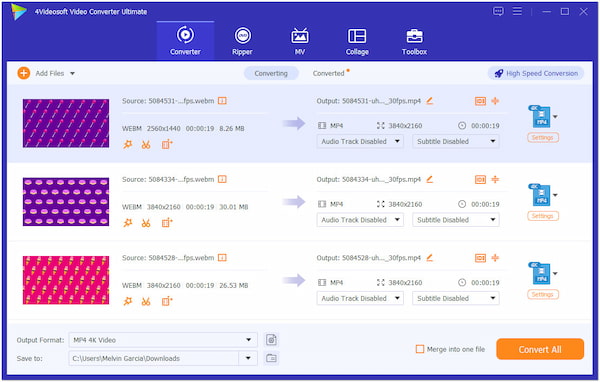
4Videosoft Video Converter Ultimate is the best video conversion software you shouldn’t miss. This multi-format conversion software has a staggering number of supported formats that reach over a thousand. It supports various input and output formats, like WebM, MKV, MP4, and more. Higher-resolution videos, such as 4K, 5K, and 8K, are also supported. But what makes it truly impressive is its simultaneous compression functionality. It can process multiple files at once at 120× ultra-fast lossless conversion speed.
Verdict: Clearly, MP4 is the winner in compatibility for its consistent playback support.
If you want to make MKV compatible across devices, learn how to convert MKV to MP4 here.
Quality
WebM vs MKV vs MP4 quality: Which is better?
MKV offers excellent quality retention as they are used for high-definition videos, Blu-ray rips, and other media. As mentioned, it supports various codecs, which allows for high-quality playback without loss in quality. MP4 balances quality and compression, providing high-quality playback optimized for streaming and storage. However, it sacrifices some quality for smaller file sizes. WebM prioritizes efficient streaming, delivering high-quality visuals with a focus on minimal loading time for online video. In actuality, it can’t match MKV in quality for HD files.
Verdict: Basically, MKV is the best choice for quality retention as it provides lossless playback.
File Size
WebM vs MKV vs MP4 file size: Which format is smaller in size?
In terms of file sizes, MKV files are larger due to the inclusion of multiple data and other metadata. As previously mentioned, MKV allows detailed customization, which increases the file size. MP4 is known for its compression efficiency, offering smaller file sizes while maintaining reasonable quality. These files are ideal for those who need a balanced quality and storage. WebM is particularly optimized for web use, often producing smaller file sizes than MP4 formats.
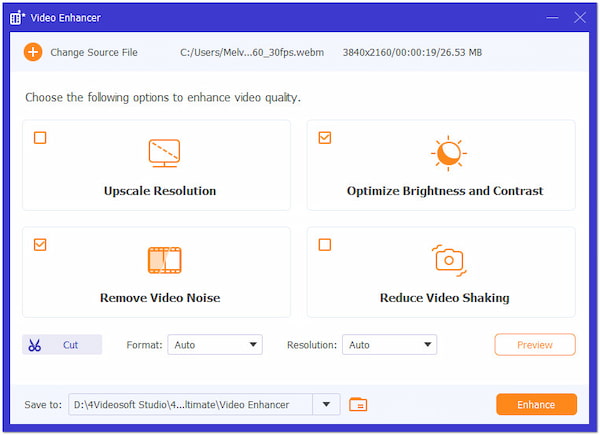
Smaller file sizes can mean lower quality if lossy compression is applied heavily. That being said, your video file will become unusable for professional projects. Don’t stress out, as there are workarounds you can apply to enhance the quality of your video. 4Videosoft Video Converter Ultimate is not just about converting video files but also includes editing and enhancement tools. It comes with a toolbox boasting 20+ essential tools, including the Video Enhancer. This feature can be used to upscale your poor-quality videos to 4K resolution, detailed and sharper. Additionally, it includes additional tools for removing visual noise, reducing video shakes, and optimizing video effects like brightness and contrast.
Verdict: Unquestionably, WebM wins for the smallest file sizes when it comes to streaming.
Features
WebM vs MKV vs MP4: Which format is rich in features?
MKV is feature-rich, supporting multiple audio and subtitle tracks, detailed metadata, and codecs. This makes MKV ideal for media like movies with multiple languages or versions. MP4 offers limited features compared to MKV, including single audio and subtitle tracks. Still, it remains highly functional for everyday use and widespread applications. WebM is focused on efficient online video playback, with no extra features for complex media presentations. This makes it lightweight and practical for web use but limited outside of that.
Verdict: MP4 is the most versatile format overall, best used for most applications.
Part 3. Choose the Right Format
General Use
For general use, MP4 is the most practical and broadly supported video format. Its universal compatibility allows it to work across devices and platforms without requiring additional software. It is also small in size due to efficient compression, which makes it easy to store and share without consuming excessive storage space.
Web Video
For web video, WebM stands out as the best choice. It offers efficient streaming and quality optimized for online use. WebM uses video codecs like VP9, which provide high-quality visuals while keeping file sizes compact. It ensures fast loading times and minimal buffering on websites. Since WebM is royalty-free, it’s highly accessible to developers and platforms.
Professional Use
For professional use, MKV is the preferred format, especially in video editing, archiving, and media distribution. MKV is highly valuable for preserving video projects with multiple tracks and high-definition visuals, all stored within a single file. It enables users to retain all original components without compromising quality.
Part 4. FAQs about MKV vs. MP4 vs. WebM
- Is MKV better than MP4 for storing movies?
Yes, MKV is better for storing movies than MP4 formats. MKV files preserve more quality and offer more customization, making them a preferred format for movie storage and backups.
- Which format is best for streaming videos online?
For online streaming, MP4 is the best choice. However, WebM is also popular for web streaming, particularly for platforms using HTML5.
- Can I convert between MKV, MP4, and WebM?
Yes, you can convert between MKV, MP4, and WebM. You can use a free online converter or offline software like 4Videosoft Video Converter Ultimate for this purpose.
- What is the difference in file size between these formats?
MKV files tend to be the largest because they can contain multiple data. MP4 files are generally smaller due to efficient compression with balanced quality and size. WebM files are optimized for web use, often yielding smaller sizes than MP4.
- Are there any copyright restrictions associated with these formats?
Yes, copyright restrictions apply differently depending on the format. MP4 and MKV may involve licensing fees for certain codecs when used in commercial applications. WebM is designed as a royalty-free format, making it ideal for web applications without licensing fees.
This post provides a complete explanation of MKV vs MP4 vs Webm. After reading this post, you should clearly understand their differences. Hope that we have helped you gain something helpful in our post. Remember, if you’re dealing with video playback, Blu-ray, picked by 4Videosoft, can be your companion. Meanwhile, if converting video files is needed, 4Videosoft Video Converter Ultimate can be your lifesaver.




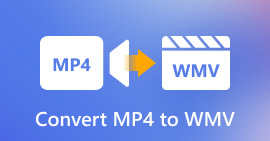 How to Convert MP4 to WMV: Fast and Easy Ways in 2025
How to Convert MP4 to WMV: Fast and Easy Ways in 2025 How to Convert MKV Files to MOV Without Losing Quality
How to Convert MKV Files to MOV Without Losing Quality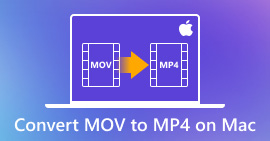 How to Convert MOV to MP4 On Mac in 4 Efficient Ways
How to Convert MOV to MP4 On Mac in 4 Efficient Ways




